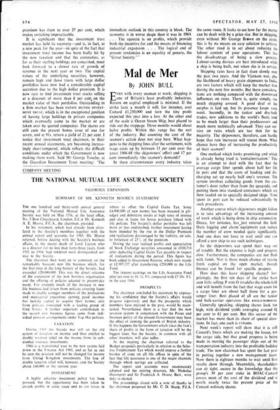COMPANY MEETING
THE NATIONAL MUTUAL LIFE ASSURANCE SOCIETY
VIGOROUS EXPANSION SUMMARY OF MR. KENNETH MOORE'S STATEMENT THE one hundred and thirty-sixth annual general meeting of the National Mutual Life Assurance Society was held on May 17th, at the head office, No. 5 Bow Churchyard. London. E.C.4. Mr. Kenneth A. E. Moore, F.C.A., the chairman, presided.
In his statement, which had already been circu- lated to the Society's members together with the annual report and accounts for 1965, Mr. Moore referred, before dealing with the Society's business affairs, to the recent death of Lord Layton who as a director for no less than forty-three years, from 1921 to 1964. had rendered most distinguished ser- vice to the Society.
The chairman then went on to comment on the remarkably buoyant new life business which, for the first time in the long history of the Society, had exceeded £20,000,000. This was the direct outcome of the expansion of the new business organisation and the offering of policies adapted to present-day needs. For example much of the increase in new life business had arisen from policies covering loans made to enable younger members of the professions and managerial executives earning good incomes but lacking capital to acquire their homes; also from polki,:s associated with a leading group of Unit Trusts. A further important contribution to the record new business figures came from indi- vidual pension arrangements under Top Hat policies.
TAXATION During 1965 the Society was still on the old system of taxation on income and thus entitled to double taxation relief on the income from its sub- stantial overseas investments.
1966 is a transitional year to the new system laid down in the Finance Act 1965, and as far as can be seen the position will not be changed for income from Unitast Kingdom investments. The loss of double taxation relief will, however, cost the Society about £40,000 in the current year.
I N VESTMENT A highly selective investment policy has been pursued, but the opportunity has been taken to encash profits in some cases and to cut losses in others to offset the Capital Gains Tax. Some £4,000,000 of new money has been invested in gilt- edged and debenture stocks at high rates of interest and also in loans for house purchase linked with life policies. The Society's dollar portfolio was left more or less undisturbed, further investment having been impeded by the rise in the Dollar Premium and realisations discouraged by the liability, on sale, to forfeiture of 25% of the premium.
During the year realised profits and appreciation of Stock Exchange securities amounted to £830,718 after deducting Capital Gains Tax payable in respect of realisations during the period. This figure has been added to Investment Reserve, which now stands at £2,907,155 after transferring £250,000 to the Life Fund.
The interest earnings on the Life Assurance Fund after tax rose to £6. Is. 8% compared with £5 I8s. 8% in the year 1964.
PROSPECTS
The chairman concluded his statement by express- ing his confidence that the Society's affairs would progress vigorously and that the prosperity which members have enjoyed in the past, would be main- tained. Nevertheless there is a fear that the new taxation system in conjunction with the Prices and Incomes policy of the present Government may have the effect of stunting the growth of British industry. If this happens the Government which takes the lion's share of profits in the form of taxation will be the biggest loser, but the Society, in common with all other investors, will also suffer.
At the meeting the chairman referred to the Budget proposis particularly in relation to the Selec- tive Employment Tax which would impose a further burden of costs on all life offices in spite of the fact that life assurance is one of the major channels through which savings are collected.
The report and accounts were unanimously adopted and the retiring directors, Mr. Nicholas Davenport and Sir Frederick A. Hoare, Bart., were duly re-elected.
The proceedings closed with a vote of thanks to the chairman proposed by Mr. C. D. Sharp, 17.1.A.


































 Previous page
Previous page